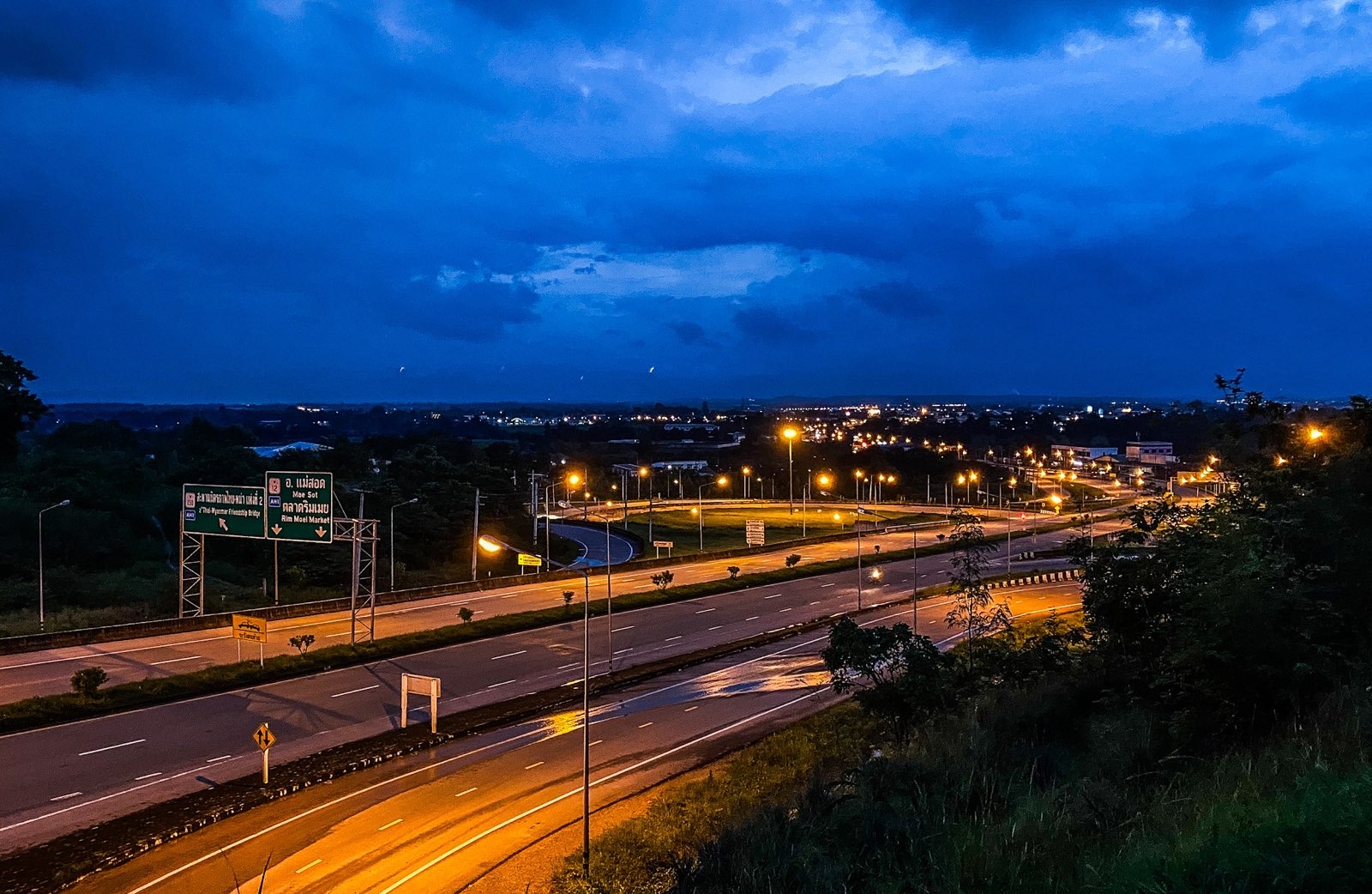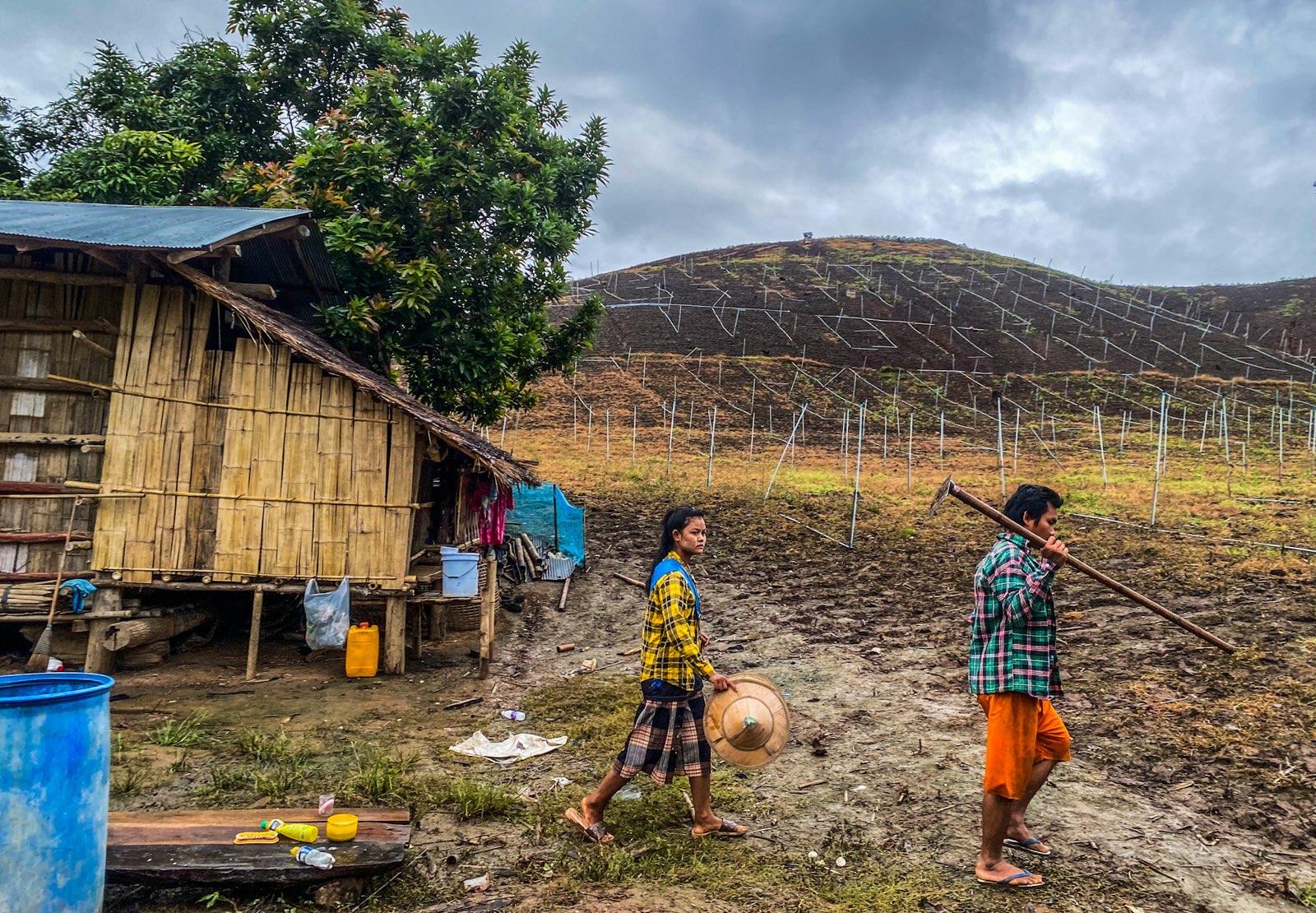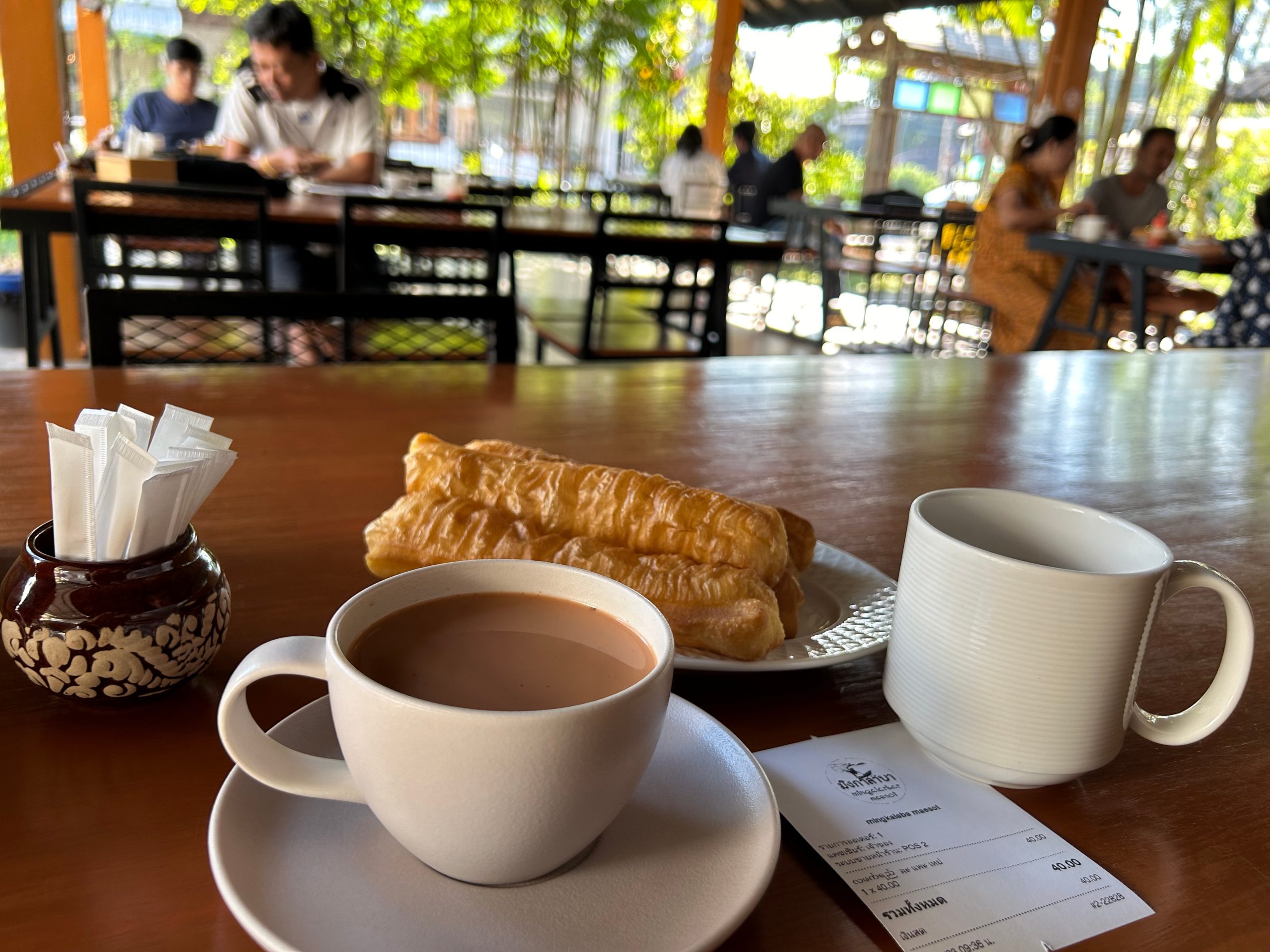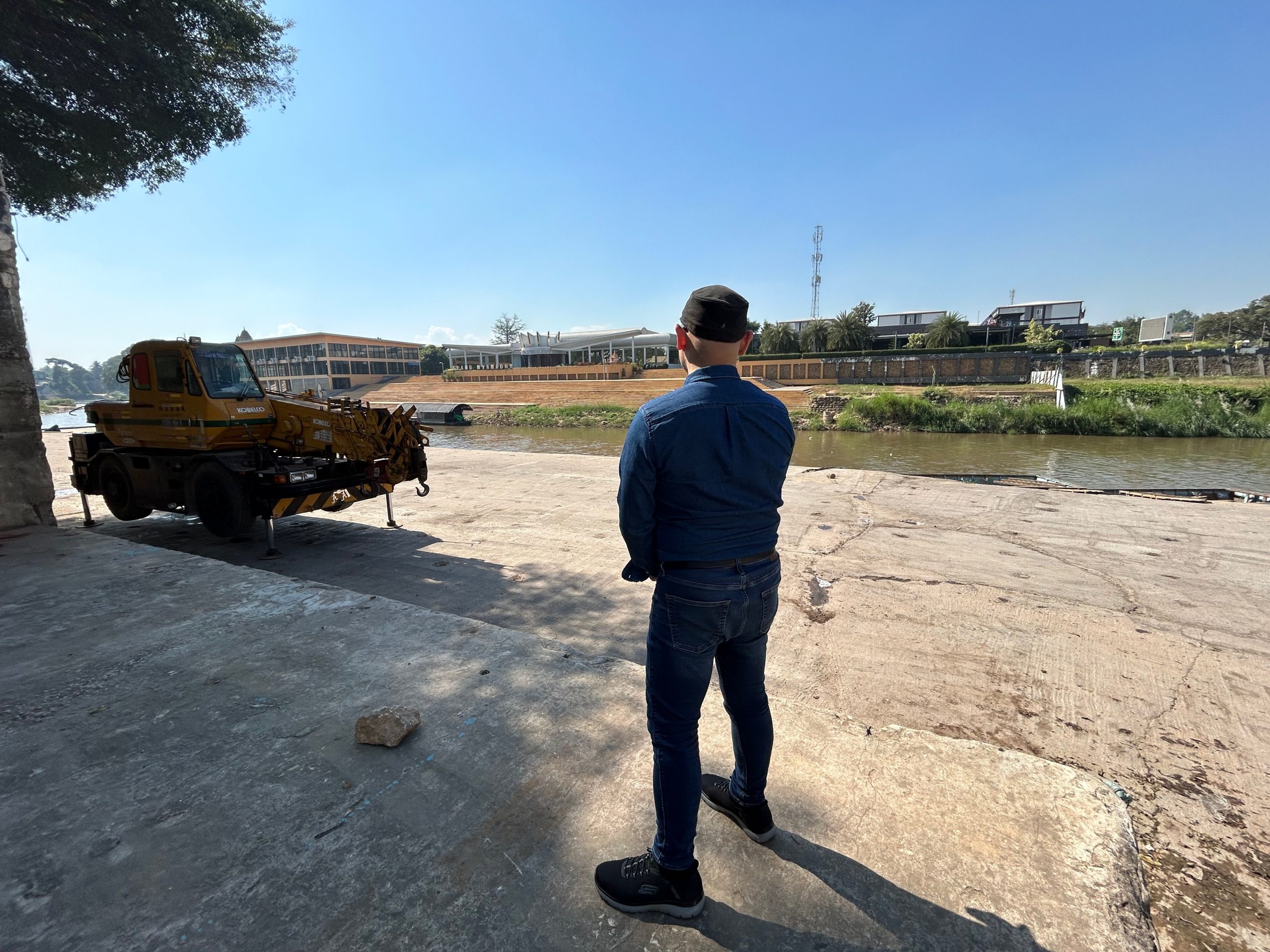A few days before Christmas, Burmese-American author and translator Kenneth Wong flew to Mae Sot, Thailand, to reunite with his university classmate Richard, a former National League for Democracy MP now living in exile, and meet the Myanmar activists he’d befriended on Facebook. As recounted below, in conversations over homemade meals and nostalgic Burmese tea, he learns about the perilous paths various characters took to get to safety after the military coup of February 2021; the migrant’s complicated feelings toward Thailand; and a community of refugees learning to reinvent themselves as they navigate a labyrinth of corruption.
Upon arriving in Mae Sot, my first shock was seeing Burmese script splashed across the airport’s vermilion walls. The arrival gate, departure gate, and check-in counters were all marked with the familiar letters with arcs and circles, right alongside Thai and English script. It was the first hint I got that Mae Sot, despite being part of Thailand, might be more Burmese in character.
For the refugees arriving here for the first time, seeing their mother tongue like I did must have been nothing short of a welcome sign, I thought. But then it dawned on me. Refugees could hardly hope to come to Mae Sot the way I did, on a comfortable one-hour flight from Bangkok’s Don Mueang airport. I could come this way because I was a tourist with an American passport. Many refugees had to slip into Mae Sot undetected, with no passport, ID, or money.
My second shock was seeing someone holding a sign with my name. His head was closely shaved like mine. He kept his sunglasses on, even though we were inside a sunless lobby. When I introduced myself, he replied in perfect English, “My boss is waiting for you in the car outside.”
Earlier that day, when I texted my friend Richard that I was coming, he replied, “I’ll pick you up at the airport. I don’t want you taking a taxi to my place. It’s for security.”

His text didn’t mention a deputy with a welcome sign. I began to wonder if I was about to be kidnapped. To my relief, as I walked into the airport parking lot, I spotted Richard’s tall figure, flashing me a smile and standing next to a car.
Richard, or Bo Bo in Burmese, was my classmate from Rangoon University in the early 1980s. While I emigrated from Myanmar to the US to start my life anew, he languished in a prison for close to two decades for being part of the 1988 uprising against the former strongman Ne Win’s socialist regime. Later, after his release in the transition period to civilian rule (2011-2021), he became an elected MP from Daw Aung San Suu Kyi’s NLD. On Feb. 1, 2021, when the Myanmar military staged yet another coup, Richard discovered he was on the wanted list.
“Around 4 a.m., I heard someone banging on my door,” Richard recalled. “I thought it was someone from my district asking me to buy him a drink.” Evidently that was the type of cozy relationship he maintained with his constituents as an MP.
“I was too sleepy to get up, so I told my wife to tell the caller I didn’t come home the night before. But then, about five minutes later, they came back. This time, they brought three uniformed soldiers with them. That was when I realized they were coming after me. This time, I refused to open the door.”
Somehow, it worked. The arrest party left without making a fuss. In the days immediately following the coup, the junta still showed some restraint, Richard pointed out. But eventually, facing unabated resistance and mounting public protests, the army would resort to the use of deadly force, including deploying snipers against the crowd in some instances. According to the Assistance Association for Political Prisoners (AAPP), the number of post-coup political prisoners currently stands at 25,700 and 4,330 people have been killed. Richard left the country before things spiraled out of control. His wife soon followed him.
“My escape was, shall we say, the adventure of a lifetime. At every checkpoint, I had a fifty-fifty chance,” he said.
Richard said people from the Karen National Union (KNU) and All Burma Students’ Democratic Front (ABSDF) helped him get to safety. The ethnic Karen have a long history of standing up to the Myanmar military. Seasoned in armed resistance, they would become a training resource for the young anti-coup fighters arriving from the big cities after February 2021.
Clearly, there are a handful of routes by which people can cross into Thailand. These underground paths have played a crucial role in funneling endangered civilians, activists, artists and defecting soldiers out of Myanmar. For the sake of those involved, the exact mechanism of escape remains a tightly kept secret.
Despite being outside Myanmar, Richard said he remained an NLD MP committed to the work he was elected to do. Like Richard, many members of the opposition have made Mae Sot their home base. Later, Richard introduced me to the man who met me at the airport as Benson, a Karen political activist. Benson and Richard shared a similar fugitive fate.
“When they couldn’t find him, they came after his son—his 3-year-old son! Can you believe this?” said Richard.
Benson and his family—including his son—escaped. They now lived a few blocks away from Richard and his wife. He was Richard’s confidant and deputy, I felt. If we drove somewhere, he was in the backseat. If we had lunch in a restaurant, he sat alone nearby, unobtrusively observing the crowd. He reminded me of those ubiquitous mythological ogres, called yak in Thai, guarding the gates of the temples.
After picking me up, Richard and Benson decided to take me where I could “see Burma from across the river.” The car eventually came to a stop by the bank of the Moei River, or Thaungyin River in Burmese. On the other side, I saw a series of block letters: Myawaddy. The only thing that separated this southeastern Myanmar border town from Mae Sot was a narrow brown river—narrow enough that in some places you could line up a couple of sampans lengthwise to make a bridge and walk across it.

Chit Su, a young activist living in Mae Sot, explained to me the logistics of the crossover. She said, “Obviously you can’t do it in broad daylight. You do it either around midnight, or really early in the morning. When I did it, it was pitch black at night. We dashed across a plain, maybe a football field. We were told we could only bring a backpack, and nothing else.”
Her first attempt didn’t go well. “Someone in the group ahead of us panicked and jumped into the river. Suddenly, the border guards’ spotlights were on them, and they got caught, so we had to retreat,” recalled Chit Su.
Myitta, another activist in Thailand, explained what happened if you get caught. “You get tossed out,” she said.
She used the Burmese verb thune cha, typically to describe emptying a basket or a garbage can. To “get tossed out” meant the Thai police or border guards would take you to a relatively safe spot on the Myanmar side and leave you there, she clarified.
“So you won’t be handed over to the Burmese Army,” I said.
“Well, if you’re someone well-known, a high priority on a wanted list, you might,” said Myitta.
According to Human Rights Watch, “Thailand has sheltered about 90,000 refugees from Myanmar across nine refugee camps since the mid-1980s. After the February 2021 coup in Myanmar, at least 45,000 additional Myanmar refugees fled to Thailand”
One Myanmar acquaintance who spotted my Facebook post in Mae Sot messaged me: “Brother, I’m in Mae Sot too. I want to come meet you, but I don’t have a police card.”

I asked Chit Su what a police card was. “They call it police card, but it’s not exactly a card,” she said. “You pay a monthly fee to an agent, about 300 baht [US$8.50]. That’s just for the person. If you plan to ride a motorcycle, like I do, you pay another 600 baht. They give you a telephone number. If you’re out and about and get caught by the police, you call that number, and you’ll be released.”
These recurring fees are less than the cost of a typical meal in the U.S., but for refugees like Chit Su and Myitta, they are a significant burden. And it gives them only limited freedom of movement. If they want greater mobility, they have to work their way up to “a pink card.”
On June 20, 2023, The Bangkok Post reported, “Bribes for pink ID cards. Tak: Mae Sot Municipality is investigating allegations that officials took bribes in issuing some 700 identification cards to migrant workers over the past three months … A local source claimed the three officials issued, on average, 15-20 ID cards per day in the past three months, demanding 40,000-100,000 baht for each card …”
Myitta said, “I’ve seen young people who committed suicide, or got sick and died while working to pay for these police cards, pink cards, work permits, and other stuff.”
Within the first few hours after my arrival, I was beginning to understand how integral the Myanmar refugees were to Mae Sot’s social fabric. When I checked into my hotel, I tried to impress the receptionist with my Thai speaking skills, only to find out she was from Myanmar. At the hotel café overlooking a sunlit courtyard, the barista greeted me in Burmese. In fact, most of the housekeeping staff at my hotel were from Myanmar.
A few of the Myanmar friends I met were surprised I had invested five months to learn to speak Thai just for a two-week vacation. Richard embarrassedly admitted, “I once hired a Thai man to teach me Thai. After a while, he began to speak fluent Burmese, but me—I can’t seem to move beyond sawadee khrab [hello]!”
For many Myanmar refugees, Thailand is not a destination of choice, but of circumstances beyond their control. Hence, they view it more as a stopover than a prospective home.
Myitta said, “As a neighboring country, Thailand knew what we were going through. I wish they’d do more to help us, but instead, once we arrived here, we had to deal with corrupt local officials. Besides, I don’t trust the Thai military. Whenever the Burmese Army put pressure on them, they’d conduct raids.”

On March 23, 2023, Radio Free Asia reported, “Authorities in western Thailand’s Tak province detained as many as 108 Myanmar nationals Wednesday in a series of raids on buildings believed to house members of anti-junta groups, confiscating what they claimed was military equipment.”
Chit Su said, “Since I’ve worked in a Bangkok restaurant, I can speak basic Thai, but my goal is not to be here permanently. I want to resettle elsewhere. I know I should learn the language of the host country where I’m sheltering, but honestly, as a language, I’m more attracted to Korean.”
The next day, I went to meet Chit Su and some Myanmar friends in a café called Mingalabar, which had all the features of a typical Yangon sidewalk teashop: open air seating with wooden tables under a large roof; and a menu touting samosas, paratha and curry, Burmese fried rice topped with fried egg; and assorted fritters. For the Myanmar people in Mae Sot, it must be a good place to pretend being back home. You pay for your tea, but you get nostalgia for free.
I ordered a crispy keema paratha stuffed with minced lamb meat, and a cup of Burmese tea, cho pawt kya (strong brew, lightly sweetened). Judging from the voices around me, most patrons were from Myanmar. Later, before parting ways, we took selfies in front of a large wall decorated with a Burmese alphabet chart.
“Have you ever ridden a motorcycle taxi?” Chit Su asked me.
“I haven’t. I’m a bit scared to. It looks dangerous—especially in the crazy Bangkok traffic,” I said.
“Well, I came here with mine. I can give you a ride back to the hotel,” Chit Su said, pointing at a large red-and-white metal beast outside the teashop.
I’d seen the yellow vest-wearing motorcycle taxi drivers all over Bangkok. A Thai friend explained to me that, just like a taxicab, you could indicate your destination and order one from an app. But instead of a cab, a motorcycle rider would come to pick you up and take you where you want to go.
Chit Su didn’t wear a yellow vest. She wore a red T-shirt with a picture of Harley Quinn holding a baseball bat. A petite girl with an oversize helmet, she looked like the anime version of the Red Power Ranger. I hopped on the back of her bike, trusting she had paid the monthly fee required to ride around town.
That night, I went to have dinner with Richard and his wife. They served me lean pork cooked with pone ye gyi (fermented bean paste). Afterward, as we sat in beach chairs in their front yard and sipped plain tea, we could hear carol singing from the houses nearby.
“All the houses around us are KNUs,” Richard said. I now understood why he didn’t want me giving out his address to a random taxi driver at the airport.
The ethnic Karen are predominantly Christians—a success story of the colonial-era missionaries. Their singing that night was the harbinger of Christmas, coming in the next few days. But for Richard and his wife and other opposition leaders living among them, the music was more than that. It meant they were protected, surrounded by allies.
Richard noticed I was looking at the guitar leaning against the wall. “That’s not the one you played the last time. It’s a new one,” he said.
During my return to Yangon in 2017, he invited me to his art gallery, which prominently featured artworks by former political prisoners. Back then, I picked up and played his guitar, decorated with a sticker of the NLD peacock.
“What happened to that guitar?” I asked.
“After I left, they raided my gallery, and took everything away, even the guitar,” he said.
“I also had to leave behind the copy of Gone with the Wind you gave me.”
Richard for some reason loved Margaret Mitchell’s masterpiece. He said he could identify with the heroine Scarlett O’Hara. I wondered if it was civil war-ravaged America that he related to.
“Scarlett’s character changes as she goes through the American civil war,” he said.
In our freshmen years at Rangoon University, Richard was one of the popular kids. He had a personal chauffer who dropped him off and picked him up. He wore imported foreign T-shirts with skinny jeans (called “elastic jeans” then) and Nike shoes—luxury items during the socialist era. Few could have imagined he would morph into a hardcore activist and fugitive politician.
On my last morning in Mae Sot, Richard took me to a teashop owned and operated by a Myanmar refugee. As he walked in, some patrons recognized him. He went around, shaking their hands and inquiring about the welfare of their families. Right before my eyes, Richard transformed back into the same MP I’d seen in 2017. He was now hundreds of kilometers away from where his township NLD office used to be, but he was still every bit a lawmaker, a people’s politician at home among his constituents.
When Richard and Benson dropped me off at Mae Sot airport, I came face to face with three Thai policemen seated before a long table. As if by design, the panel consisted of an amiable officer (left), an indifferent one (middle) and a grumpy one (right). Looking at my Chinese features, the amiable one kicked off the inquisition with, “Nee hao!”
Throughout my stay in Mae Sot, I rarely had the chance to speak Thai, because almost everyone I met turned out to be a Myanmar refugee. Even the Thais I met spoke to me in broken Burmese, depriving me of the opportunity to practice my Thai. Here, finally, was my chance.
“I’m sorry. I don’t speak Thai very well. I’m from America. Here’s my passport,” I said in passable Thai.
Officer Amiable complemented me on my Thai. He hardly looked at my passport. He merely passed it to his colleague in the middle. Next, Officer Indifferent glanced at my passport, flipped through a few pages, then passed it to Officer Grumpy. The last one took a long, hard look at the arrival stamp on my passport. He then pulled out his smartphone and began snapping photos of the pages of my passport. Afterward, he gave me my passport back and waved me along. It made me wonder how the scenario would have played out if I had been a refugee without acceptable documents.
While I was waiting to board my Nok Air flight back to Bangkok, I noticed Myitta had posted some photos to her Facebook wall. Evidently, she and a group of refugees had traveled overnight to a church in a nearby province to distribute the donated toys they had collected to other refugee kids. The Myanmar Gen Z activists often say, “Ngah do hmah, ngah do bae shi dae.” (“We have no one but ourselves.”) The motto struck me as an expression of both helplessness and self-reliance.
On the day I went to the Moei River, I saw a teenaged girl in a plaid shirt shouting in Burmese at someone on the other side. “Hey, did aunty get home OK? Did she bring you back my gifts?” Loud and clear, the answer came back from the Myanmar side. “Yes, she’s back now. Thanks for the snacks and the medicine, sis!”
The conversation went on for 10 minutes or more, covering everything from an acquaintance’s wedding to the price of dried fish. When I was a kid growing up in Yangon, my next-door neighbor and I used to speak to each other through cups and strings just like this across our adjacent verandahs. Except, the girls’ cross-river conversation was occurring across two countries. It was technically an international call, facilitated not by a mobile network but by the wind only—the wind that ferries hopes and dreams across the river with no regard for the silly humans’ political borders.
Note: Some names and details of individuals were altered to protect their identity.
Kenneth Wong is a Burmese-American author, translator and language teacher. Born and raised in Yangon, he currently lives in San Francisco, California and teaches Burmese language at UC Berkeley. His essays, short stories, articles and poetry translations have appeared in the San Francisco Chronicle, AGNI, Grain, The Irrawaddy, Myanmar Times, Two Lines Press and The Journal of Burma Studies, among others.
















